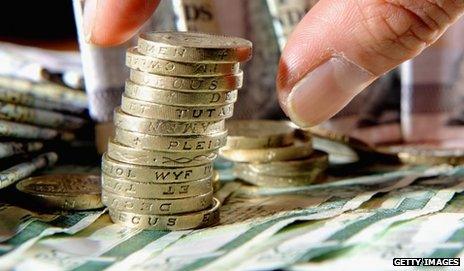Scotland – Sir Humphrey joins the row
- Published

Today the argument about whether an independent Scotland can not just continue to use the pound but form a "currency union" with the rest of the UK took on a whole new dimension.
It's not just that the three anti-independence parties have come together to say that whoever was in the next Westminster government would say no. What's really striking is the publication of the normally private advice of the top Treasury mandarin Sir Nicholas Macpherson. Here's a summary of what he says
"I would advise you against entering into a currency union with an independent Scotland"
"There is no evidence that adequate proposals or policy changes ...could be devised, agreed and implemented by both governments in the foreseeable future"
Here are the reasons he gives:
1. Uncertainty - The Scottish Government is leaving the option open of moving to a different currency later - "Imagine what would have happened to Greece two years ago if they had said they were contemplating reverting to the Drachma".
2. Banking risk - Scotland's banking sector is far too big in relation to its national income - "very real risk that the continuing UK would end up bearing most of the... liquidity and solvency risk".
3. Lack of balance or "asymmetry" - The continuing UK would be at risk of bailing out Scottish banks and debt BUT Scotland could never bail out an economy nearly ten times its size.
4. "Misaligned" tax and spending policies - Recent spending and tax commitments by the Scottish Government suggest no "strong commitment to a rigorous fiscal policy" and "persistently optimistic projections of North Sea revenues" are "at odds not just with the Treasury but with the Office of Budget Responsibility".
What, then, about the threat made by the Scottish government that in post independence negotiations they could refuse to pick up a share of Scottish debt?
Sir Nicholas could not be clearer: "You can expect the Scottish Government to threaten not to take on its share of the United Kingdom's debt. I do not believe this is a credible threat."
The Deputy First Minister Nicola Sturgeon has reacted by saying: "There are some very strong, practical, hard-headed reasons why continuing to use the same currency is in the interests of people across the rest of the UK."
She said exports from England into Scotland were worth £60 billion a year so using different currencies would "cost England hundreds of million of pounds in transaction costs".
Sturgeon added: "Right now oil and gas exports contribute about £30 billion to the UK balance of payments. If we don't have a shared currency that is removed from the UK's balance of payments and the UK trade deficit goes through the roof, that has an impact on the value of sterling."
Those arguments are now being put to very severe test.